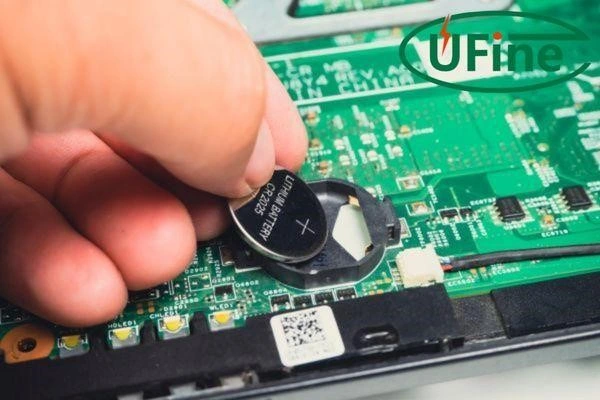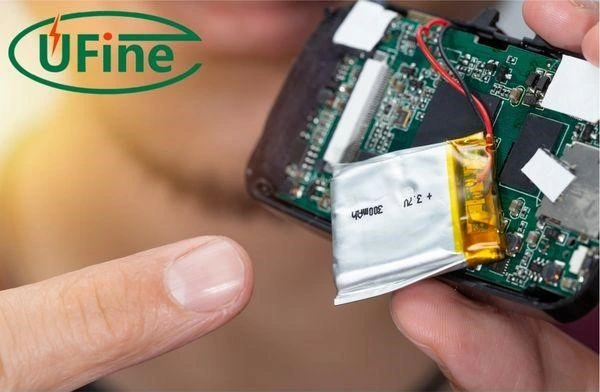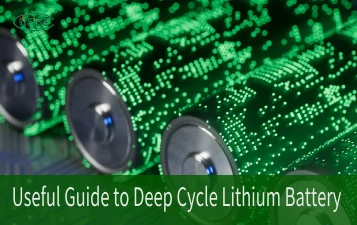Today, lithium-ion batteries are the first choice for powering up every electronic device. Lithium batteries are popular because of their battery’s ability to store high-density power within a minimal footprint. Now, even a small remote of your car key is also equipped with a small lithium ion battery, providing usability for a long time. To acknowledge the importance of these small lithium batteries, this article will talk about a small lithium ion battery’s usability, specs, and future development.

Part 1. What Does a Small Lithium Ion Battery Mean?
Lithium ion batteries come in many sizes and power ranges. But we are here to talk about specifically a small lithium ion battery. A small lithium battery is a battery with limited lithium or power capacity. It usually comes in small sizes. The US Department of Translation (DOT) defines a small lithium ion battery containing 8 grams of equivalent lithium content in the battery.
According to the International Air Transportation Association (IATA), a small lithium battery has no more than 100wh (watts hour) capacity. So, a small lithium ion battery is physically small in size, often measuring in millimeters, with a limited energy capacity. Most of these batteries power up small electric devices like earbuds, remotes, smart keys, tiny cameras, drones, etc.
Part 2. Small lithium Polymer battery vs. Small LiFePO4 Battery
In the realm of a small lithium ion battery, two dominant types are competing with each other. The first is a small lithium polymer battery, and the second is a small LiFePO4 battery. Both utilize lithium ion technology for recharging and delivering power.
Chemistry
- A small lithium polymer battery LiPo uses solid or gel-type electrolytes. It helps shape thin, flexible designs, making it ideal for smartphones, drones, and electric toys.
- A small LiFePO4 battery uses lithium iron phosphate compound for cathode material. It makes a safe and stable chemical that can handle thermal runaway.
- If you want a compact size of high energy, a small lithium polymer battery is the ideal choice. It can fit in small devices easily and provide more energy.
- Small LiFePO4 battery has a lower energy ratio but can discharge at high rates.
- LiPO batteries provide a lifespan of around 300 to 500 charge cycles. After completing its charge cycles, it starts to lose efficiency.
- LIFePO4 is a small lithium rechargeable battery with more than 2000 charge cycles. So it does not need to be replaced frequently.
Part 3. Comparison Table of Small lithium Polymer battery vs. Small LiFePo4 Battery
Here is an expanded comparison table includes more detailed specifications of a small lithium polymer battery (LiFo) and a small lithium LiFePO4 battery.
| Aspect | Small Lithium Polymer Battery | Small LiFePO4 Battery |
|---|---|---|
| Chemistry | Lithium Polymer (LiPo) | Lithium Iron Phosphate (LiFePO4) |
| Energy Density | High (100-265 Wh/kg) | Moderate (90-120 Wh/kg) |
| Safety | More susceptible to thermal runaway (overheating) | More stable and less overheating issues |
| Cycle Life | Moderate (300-500 cycles) | High (2000-3000 cycles) |
| Voltage Range | 3.7V (nominal), 4.2V (fully charged), 3.0V (discharged) | 3.2V (nominal), 3.6V (fully charged), 2.8V (discharged) |
| Self-Discharge Rate | Approximately 5-10% per month | Approximately 2-3% per month |
| Charging Time | Fast 1-3 hours | Moderate 3-5 hours |
| Operating Temperature Range | -20°C to 60°C | -20°C to 60°C |
| Cost | Relatively Low | Relatively High |
| Application Examples | Mobile devices, drones, RC models | Electric vehicles, solar energy storage |
Part 4. Common Features of Small Lithium Battery

Don’t undermine the small size of a lithium ion battery, but see the key feature inside these batteries that makes them so popular. These come with many features that are widely accepted all over the globe. Here are some of the key features of a small lithium ion battery:
1. High Energy Density
Though lithium ions come in every size, the thing that makes lithium ideal for electronic devices is its high energy ratio. A small lithium battery can power the device for many days.
2. Long Cycle Life
The lifespan of a small lithium battery is from 300 to 500 charge cycles. It does not lose efficiency for a long time and covers the initial buying cost of the battery.
3. Low Self-Discharge
One of the prominent features of a small li ion battery is the minimum usage of charge in standby condition. We often do not use the device for days and weeks. In such conditions, the battery can maintain the charge level and provide the same backup.
4. High Discharge Rate Capability
Though it is a small lithium battery, you can expect a high discharge rate when your device needs it during utilization. These batteries can constantly provide the same amount of power to the device till it reaches discharge level.
5. Wide Operating Temperature Range
They can function effectively under various temperatures, expanding their potential for use in environments with extreme conditions.\
6. High Charging Efficiency
Your small lithium ion battery can charge within 30 minutes to deliver many hours of backup. It utilizes the maximum input power into usable energy with minimum wastage during charging.
7. Low Maintenance
Lithium batteries are known as maintenance-free batteries. Once you have installed a small lithium battery, you will not need to look after or make frequent changes. Its long shelf life provides a stable solution for small electrical gadgets.
Part 5. Usability in Day-to-Day Devices
Despite its diminutive size, a small lithium rechargeable battery packs a powerful punch. These tiny powerhouses are revolutionizing our daily lives, powering many devices, from smartphones and smartwatches to medical equipment and wearable technology. Their impressive energy density, long lifespan, and minimal maintenance requirements make them ideal for powering our increasingly portable and interconnected world.
1. Portable Electronics
Now, we are always connected with the help of portable electronics like smartphones, laptops, tablets, headphones, earbuds, etc. These devices heavily rely on small lithium batteries as a power source. Therefore, a small lithium polymer battery is ideal for these devices.
2. Wearable Devices
A small lithium battery enables your wearable devices, including smartwatches and fitness trackers, to keep running. A quick charge of these wearable devices can provide backup for over a week.
3. Medical Devices
Today small li ion batteries are taking part in saving people’s lives. Devices like peacemakers, insulin pumps, and hearing aids utilize a small lithium ion battery for running. So indirectly, these batteries are a part of medication for patients.
4. IoT Devices
Smart Home Devices Sensors use these small, battery-powered devices that require minimal energy to collect data and communicate wirelessly.
5. Power Tools
Cordless Drills, Saws, etc also utilize a small li ion battery having a high-discharge rate battery to deliver the power needed for various tasks.
6. Aerospace and Defense Applications
With the adoption of a new technology of drones, satellites, and military equipment utilization of lithium ion batteries is always a basic requirement. It provides these applications with compact, lightweight batteries with high energy density for long-range operation.
Part 6. Conclusion
A small lithium ion battery greatly impacts the electronic industry and modern technology. It helps shape the innovative ideas of modern electronic devices like earbuds, mini cameras, drones, etc. As technology continues to evolve, we can expect some more new and advanced electronic gadgets powered by a small lithium ion battery in the future. However, lithium batteries need to be safer and long-lasting for more adaptability in electronic devices.
Related Tags:
More Articles

Overview of Deep Cycle Lithium Battery
In this article, we explore the life, voltage, capacity, and charging considerations of deep cycle lithium batteries.
How Long do Lithium Batteries Last?
How long do lithium batteries last? we will explore the factors that influence the lifespan of lithium batteries and provide insights into their longevity.
How to Choose the Best LiFePO4 Battery?
Choose LiFePO4 batteries for superior performance, safety, and versatility in EVs, UPS, and backup power. This guide helps you make informed decisions.
Get 12v Lithium Car Battery As a Power Source for the Ride
Make the right choice for your vehicle's battery needs by installing a 12 volt lithium car battery. You will enjoy maintenance-free longevity with this change.
Why Should You Choose Lithium Ion Marine Battery?
Upgrade your boat's power with a Lithium ion marine battery, featuring lighter, longer life, faster-charging abilities. Let's choose the best marine battery.





